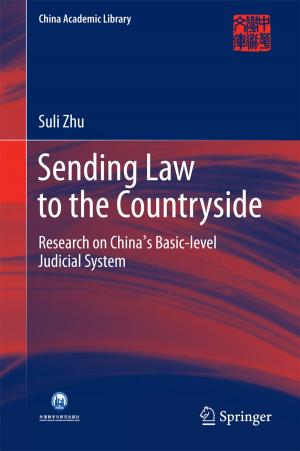The Sociotechnical Constitution of Resilience
A New Perspective on Governing Risk and Disaster
Nonfiction, Social & Cultural Studies, Social Science, Sociology, Urban| Author: | ISBN: | 9789811085093 | |
| Publisher: | Springer Singapore | Publication: | May 17, 2018 |
| Imprint: | Palgrave Macmillan | Language: | English |
| Author: | |
| ISBN: | 9789811085093 |
| Publisher: | Springer Singapore |
| Publication: | May 17, 2018 |
| Imprint: | Palgrave Macmillan |
| Language: | English |
This book considers the concept of resilience in a global society where coping with the consequence and long term impact of crisis and disaster challenges the capacity of communities to bounce back in the event of severe disruption. Catastrophic events such as the 9.11 terrorist attack, the Fukushima nuclear disaster, and the volcano eruption in Central Java entailed massive devastation on physical infrastructures, and caused significant social and economic damage. This book considers how the modern sociotechnological system facilitating human activity defines how societies survive and whether a crisis will be short-lived or prolonged. Drawing on the concept of sociotechnical resilience, this book closely examines a range of events North America, Asia, Australia, and Europe. By presenting the successes and failures of sociotechnical resilience, it offers important insights and practical lessons to build better and comprehensive understandings of resilience in a real-world setting, significantly contributing to the study of disaster resilience.
This book considers the concept of resilience in a global society where coping with the consequence and long term impact of crisis and disaster challenges the capacity of communities to bounce back in the event of severe disruption. Catastrophic events such as the 9.11 terrorist attack, the Fukushima nuclear disaster, and the volcano eruption in Central Java entailed massive devastation on physical infrastructures, and caused significant social and economic damage. This book considers how the modern sociotechnological system facilitating human activity defines how societies survive and whether a crisis will be short-lived or prolonged. Drawing on the concept of sociotechnical resilience, this book closely examines a range of events North America, Asia, Australia, and Europe. By presenting the successes and failures of sociotechnical resilience, it offers important insights and practical lessons to build better and comprehensive understandings of resilience in a real-world setting, significantly contributing to the study of disaster resilience.















